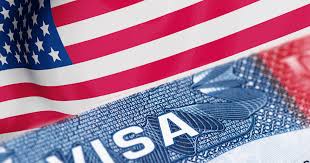
Daniel Otera
The Nigeria Immigration Service (NIS) has warned that increasing cases of visa abuse by Nigerian travellers could jeopardise legitimate migration pathways, especially for students and skilled professionals.
In a statement issued in Abuja on Saturday, NIS spokesperson Akinsola Akinlabi said the United States government had raised fresh concerns over frequent violations by Nigerian visa holders. These include overstaying, false declarations, and students dropping out shortly after entering the country.
“Any breach of immigration or other laws can lead to visa revocation or deportation,” Akinlabi said. “Breach of visa conditions, including overstaying, may attract severe penalties, including removal from the US and permanent ineligibility for future travel.”
The warning comes at a time when Nigerian enrolment in American universities is at its highest. According to the 2024 Open Doors Report, more than 20,000 Nigerian students were registered at US institutions in the 2023/24 academic year up 13.5 percent from the previous year. This makes Nigeria the top African source of international students in the US and ranks it seventh globally.
The surge reflects strong demand for international education in science, technology, medicine, and business. But experts warn the rise in applications has also brought heightened scrutiny. US officials say they are closely monitoring patterns of visa misuse, including instances where travellers arrive under false pretences.
“There are specific visa categories for medical treatment or childbirth. Using a tourist visa for that purpose can trigger denial of entry or future applications,” said a senior official at the US Embassy in Abuja, speaking anonymously due to diplomatic protocol.
Despite the rise in enrolment, many Nigerian applicants are being turned away.
Data from the US State Department shows that in 2023, the non-immigrant visa refusal rate for Nigerian applicants stood at 65.7 percent, one of the highest in sub-Saharan Africa. Travel consultants blame a mix of desperation and misinformation, often fuelled by shady agents who coach applicants to lie during interviews.
“People are advised to present fabricated bank statements, or fake job and school letters. It’s becoming a problem,” said a Lagos-based visa consultant who asked not to be named.
The result, analysts say, is a tightening visa process that increasingly penalises genuine applicants.
In Washington, some US lawmakers have raised concerns over “disproportionate denial patterns” affecting African students. Advocacy groups are now calling for more transparent and equitable review systems, especially for applicants from countries like Nigeria that have strong education and labour migration ties.
The NIS has warned that students who fail to maintain their status by skipping classes, withdrawing without notice, or switching institutions without approval risk immediate cancellation of their visa.
“Students must remain enrolled and attend classes regularly. Unauthorised withdrawal or absenteeism can result in automatic visa termination,” the Service said.
Officials also noted that continued misuse could lead to broader visa sanctions.
“The NIS will continue to collaborate with the US Mission in Abuja to ensure Nigeria is not included in any expanded visa restrictions,” Akinlabi added.
With Nigeria’s unemployment crisis worsening, many young people see migration as their only option. UNESCO estimates that over 53 percent of Nigerian youth were unemployed as of 2020, with the numbers rising sharply among new graduates and skilled professionals.
This economic pressure, immigration authorities warn, is pushing some to make reckless choices. Misrepresenting visa intentions, overstaying, or abandoning school puts not only the individual at risk but also dents the credibility of other applicants.
“Aspirations to travel are understandable,” an NIS official said, “but when people break visa rules, they don’t just damage their own chances, they make things harder for everyone else.”
As visa denials rise, the message from authorities is clear: follow the rules, or risk shutting the door for others.
